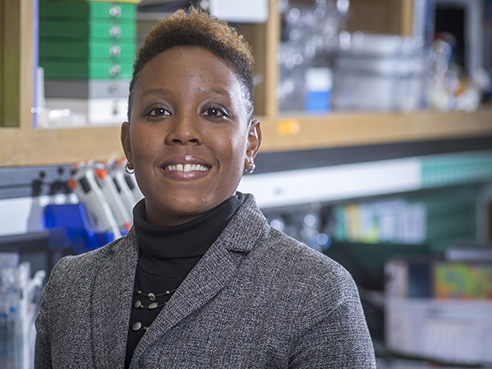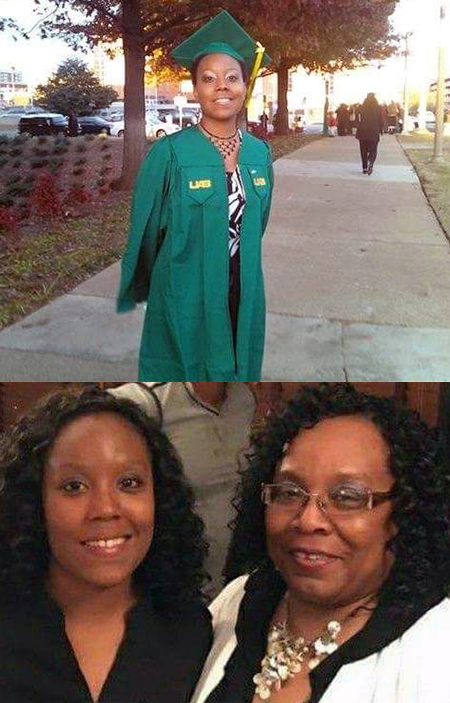 Kiera Walker
Kiera Walker
At one point, Kiera Walker was working weekdays 8 a.m.-1 p.m. in a research lab and studying part-time for her graduate degree in counselor education at UAB. Then, from 1-7:30 p.m., she’d work at the Community Counseling Clinic for her internship and attend classes on campus. Any spare time and Saturdays and Sundays was spent in the research lab to reach the 40-hour minimum.
The more than three years Walker spent balancing part-time school and full-time work with multiple volunteering commitments were some of the most difficult she’s encountered, but it ultimately was worth it when she graduated with her master’s degree in April 2017.
Walker, who also earned a bachelor’s degree in biology from UAB in 2008, said she’d always known she wanted to get a master’s degree in something else, so she volunteered as a rape-response advocate for several years to see if counseling could be the right fit.
“I fell in love with it and wanted to do it, but I also still loved research,” Walker said.
So, she decided to keep doing both, finding opportunities to get her research published and get hired by UAB’s Student Counseling Center one month after graduation.
Research days
While working in the lab of Anita Hjelmeland, Ph.D., assistant professor of biology, Walker studied glioblastoma treatments, ultimately co-authoring a paper published in December 2017 on the use of an experimental enzyme inhibitor and the standard chemotherapy drug temozolomide to treat glioblastoma.
Walker also co-authored a chapter titled “Clinical Neuroscience of Substance Use Disorders” in the 2017 book “Neurocounseling: Brian-Based Clinical Approaches” with Sean Hall, Ph.D., assistant professor of counseling education and director of the Community Counseling Clinic.
|
"I think doing research has made me a stronger counselor.” |
She knows that at first glance her passions for research and counseling may seem entirely unrelated, but Walker says she uses the same skills she used in research “just in a different way.”
“In both, you’re assessing all the time. In counseling, you’re assessing what state of mind someone is in, what their needs are and how you can meet that need,” she said. “It’s often about what people don’t say.
“The skills you hone on research come up a lot on this side. I think doing research has made me a stronger counselor,” Walker said.
Counseling also gives Walker the opportunity to do something research often did not: the opportunity to help people in the moment.
“The cancer I studied is terminal, and I would meet people that either had it themselves or knew someone who’d passed from it. What I was studying matters, and hopefully one day we will have something that helps people, but I was finding myself wondering, ‘What can I give them now? How can I help them?’”
|
“When you have faculty who believe in you, it helps with your drive on the days you feel bad. They can reinvigorate you.” |
Drive to finish
More than once Walker reconsidered her career path when her undergraduate biology courses almost seemed too much for her.
“I almost changed my major to psychology because I knew I could excel in that,” she said. “But in my junior year, I had to have a heart-to-heart with myself. I could change my major because it was easier for me, or I could do what I had always wanted to do, and I’d always wanted a degree in biology.”
Walker said the struggles both in and outside the classroom taught her important lessons about perseverance, endurance and the “drive to finish.”
She also said programs such as Trio Academic Services and the faculty she met encouraged and inspired her to believe in herself.
“When you have faculty who believe in you, it helps with your drive on the days you feel bad,” Walker said. “They can reinvigorate you.”
 Top, Kiera at her 2008 UAB graduation; below, with her mother, who also pursued a masters in counselingLand of opportunity
Top, Kiera at her 2008 UAB graduation; below, with her mother, who also pursued a masters in counselingLand of opportunity
While in high school, mulling over a potential interest in forensic pathology, Walker chose UAB literature from a stack of pamphlets. She had extended family in the city, which pleased her parents, and after a campus tour chock full of information about UAB’s preeminence in the sciences, Walker says she was in love.
But above all that, she says, UAB’s commitment to diversity was a huge factor in her choice to attend. Walker’s father was in the military and living on Naval Station Norfolk had accustomed her to being surrounded by all different types of people.
“I knew I wouldn’t have a hard time coming here because there would always be a group of some sort that I could be a part of,” she said. “I didn’t want predominantly one thing or the other. I wanted a lot of opportunities.”
Family ties
And it was opportunities she got — opportunities for an education that allowed her to do research she was excited about, which in turn allowed her to pursue another degree and another passion and the opportunity to connect with her mother in an unexpected way.
Walker was technically a first-generation college student when she began UAB. Though her older brother began school before she did, he hadn’t yet graduated when she started, and neither of her parents had pursued four-year college degrees.
|
“I knew I wouldn’t have a hard time coming here because there would always be a group of some sort that I could be a part of.” |
However, Walker’s mother, a longtime graphic designer, soon decided to pursue a bachelor’s degree in human studies at a school in Norfolk and subsequently became a social worker. Then, just one semester after Walker began her master’s program in counselor education, her mother also decided to pursue a higher degree — in the same field.
“My mother was always the person people would go to and talk and get advice, but counseling was never something I thought she’d particularly seek out,” Walker said. “I never thought I would either; yet we ended up in the same place.”
Open doors
Walker also had more chances at UAB to learn about herself and pursue opportunities from which she might have otherwise shied.
Equally important, Walker learned to trust herself and her instincts: “When you’re looking at what’s being presented to you, there also is an intuition within yourself you have to learn to trust.”
|
"Taking a leap is sometimes the best decision you can make.” |
While in graduate school and working full-time in the lab, Walker was president of Chi Sigma Iota: Zeta Chapter, an international honors society for academic and professional excellence in counseling. Walker, who always has been more comfortable out of the spotlight, said she was inspired to take the leadership position because of something Associate Professor Larry Tyson, Ph.D., frequently told his students: Doors will open up in front of you, but it is your responsibility to walk through them and seize the opportunities behind them.
“A lot of times, we think we have a plan,” Walker said. “To take that leadership position, which I was not innately geared to be a part of, was a door that was open to me. That really resonated with me. You have to be willing to take the risk to do something that isn’t familiar. A level of uncertainty has its benefits.
“Taking a leap is sometimes the best decision you can make.”
